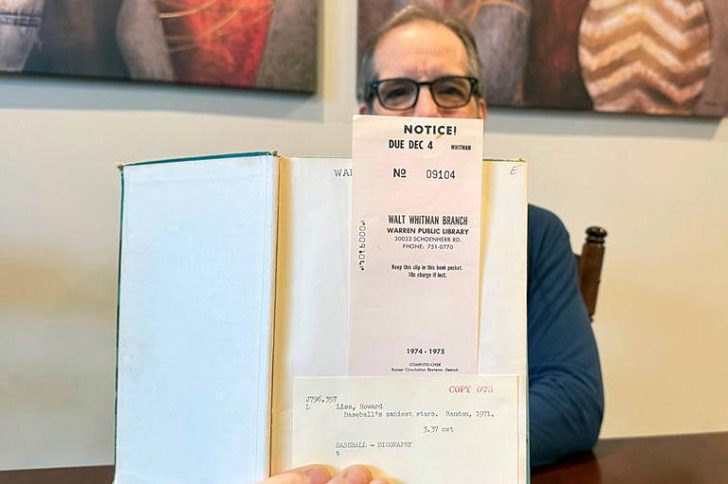A suburban Detroit library made headlines when it allowed a man to keep an overdue baseball book fifty years after it was borrowed. Chuck Hildebrandt, now 63, borrowed Baseball’s Zaniest Stars in 1974 from a Warren, Michigan library as a 13-year-old baseball enthusiast. Decades later, he found the book while reorganizing his belongings and decided to return it, expecting a fine. Instead, he was met with an unexpected response that reflects a shift in how libraries engage with their communities.
Rediscovering a Long-Lost Childhood Memory
During a routine organization of his bookshelves, Hildebrandt noticed the book’s Dewey Decimal label, which triggered a memory of his boyhood fascination with baseball. Inside, he found the original library slip, revealing that the book was due back on December 4, 1974. For Hildebrandt, it was a nostalgic discovery tied to his younger days as a self-proclaimed “baseball nut.”
“When you’re moving with a bunch of books, you’re not checking every one,” he shared, explaining how the book got lost in the shuffle of multiple moves over the years. His career had taken him to several cities, and the book ended up tucked away and forgotten until this serendipitous moment.

William Walker | MSN | Hildebrandt found the original library slip, revealing that the book was due back on December 4, 1974.
Hildebrandt’s Thoughtful Plan to Return the Book
Rather than quietly returning the overdue book, Hildebrandt devised a creative plan. He decided to wait until the 50th anniversary of its due date in 2024, envisioning it as an opportunity to celebrate a unique piece of personal and library history. He believed the gesture could highlight the cultural value of libraries and their role in fostering childhood passions.
On a Thanksgiving trip to Michigan, Hildebrandt brought the book to the Warren Public Library. He explained its backstory to library director Oksana Urban, presenting the overdue book as both a heartfelt return and a piece of nostalgia. The encounter turned into a lighthearted moment that brought smiles to the library staff, as well as a renewed appreciation for the role libraries play in shaping lifelong memories.
Library’s Surprising Response
To Hildebrandt’s surprise, Urban told him he could keep the book, waiving all overdue fines. The library viewed the incident as a heartwarming story, emphasizing their focus on community connections rather than penalizing borrowers.
Urban remarked that forgiving the overdue book was part of the library’s mission to foster goodwill and encourage people to engage with its resources. Hildebrandt described the decision as unexpected but fitting, given the book’s significance as a relic of his youth.
The Evolving Role of Libraries

Genaro Servín | Pexels | Libraries are becoming dynamic spaces for learning, connection, and preserving shared memories.
Stories like Hildebrandt’s highlight how libraries are evolving to meet the needs of modern communities. They are no longer just places for borrowing books; instead, they are becoming dynamic spaces for learning, connection, and preserving shared memories. Overdue books, once seen as liabilities, now serve as symbols of the enduring relationship between individuals and their local libraries.
This trend of forgiving overdue materials reflects a larger movement among libraries to eliminate fines, aiming to create a more inclusive environment. By doing so, libraries encourage broader access to their resources, ensuring that people feel welcome no matter their circumstances.
A Book’s Lasting Impact
Hildebrandt’s overdue baseball book represents more than just a lapse in returning library materials. It embodies the lasting influence libraries can have on individuals, sparking interests and shaping memories that endure for decades. For Hildebrandt, the book became a bridge to his past, rekindling his love for baseball and offering a unique connection to his hometown.
The Warren Public Library’s decision to waive fines also serves as a reminder of the role libraries play in building community goodwill. By embracing such moments, they ensure that their spaces remain welcoming and impactful for generations to come.













